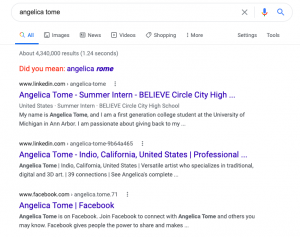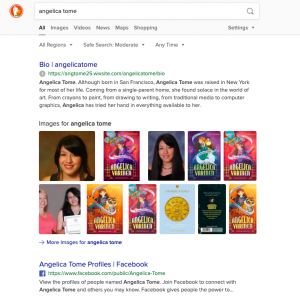Angelica Tome
Online Data Identity
Ever since I was introduced to the internet, I have tried to be careful with what personal information I put out on my behalf. The first few social media accounts I created never had my full name until I was a senior in high school. My profile names and usernames were always under the band One Direction members' names', a funny phrase, or the name of a character from a show just to keep my full name from being at anyone’s disposal on the internet. Eventually, as I grew older, it became inevitable to stay “off the grid” without having personal data on the personal or professional platforms I use. To this day and to my knowledge, only my Facebook and LinkedIn profile have my full name and the rest of my social media accounts are a funny phrase or the name of a character. With the effort I have put in to keep my name off the internet, I, like many other people, have been curious about what information the internet has on me, from social media search appearances, images, and other information out there.
I “Googled” Myself
Of course, the first place I used to search my name was through Google. The results of the search were as I expected. The first link directs the search to my LinkedIn Account that I currently use. This is great for employers, I assume! However, the rest of the links in the first page of the search are not associated with me. This part surprised me because I was not aware that so many “Angelica Tome” existed because one, Angelica is not so common, and two, I have never heard anyone else’s last name be “Tome.” I also browsed through the images that came up for my name search. The first image was an old profile picture that is linked to my LinkedIn profile. The other images were unfamiliar to me.
To further search for information, I searched my name on the DuckDuckGo search engine, a search engine made to protect user’s data and information from being tracked and sold. The first link that appeared was the same that Google brought back: my LinkedIn profile. The rest of the links were not associated with me. I also decided to look at the images, and surprisingly none of the search results were of me or associated with me. That leads me to wonder why the same search results came up for both Google and DuckDuckGo, but not the same image results.
Lastly, I used a free online data broker, FastPeopleSearch, to look myself up. I searched myself twice, one with my permanent home state location and one in Michigan. There were no results for my name when I searched using Ann Arbor, Michigan. However, when I searched with my permanent home state, I got detailed results. My address, age, relatives, how long I had lived at my current address, and my neighbors’ information all came up with this simple search. How did they get all this information? I don’t know! Is it creepy? Yes! But I knew it was bound to appear with all the information that is put online through online services and physical mail and deliveries.
Presentation and Privacy
I am not disappointed with the search results that come up when I searched my name directly on search engines. Although there was one image and one link result that were associated with me, neither of them are unprofessional, if you will. I believe that is partially representative of my online identity. I don’t post content that would be considered irrational or misconstrued by the general public; rather it mainly consists of social rights issues, online activism content, personal stories, and humour. I was curious to see if by adding certain keywords after my name, I would have different search results. I tried a few different keywords like my high school’s name, U of M, and my usernames on certain platforms, and the results were similar, if not the same.
The simple search of my name on the search engines returns less information than other people I know, and in a way it is both good and bad. These results are good because my information is not fully publicly available unless you go to the data broker websites like FastPeopleSearch and get limited yet valuable amounts of information. If someone wants more information, they have to pay about $40 for one search in alternate data broker sites. This may also be bad because it appears as if there is not much information coming up for my name search in popular search engines, but I am sure there is more data out there than what I am aware of if I were to pay for those data broker files. The most shocking part about this is not how much information data brokers have the potential to have, but the fact that commercialism is a big factor in all of this. People will pay money to have access to a full report of themselves or someone else’s online data.
It has been a while since the internet became available to the public that I would think more people would know about the personal data collection online. However, it is certain there are people who are not aware about the online data collection happening behind the scenes of ordinary Google searches and typical social media posts or engagements. It should be strictly emphasized to know about online data collection at least at a beginner level, or it should be taught at school or work. We are in a generation where technology has so much influence in people’s lives that it is crucial to know what impact technology has on online presence and data.
Conclusion
After searching my name on multiple search engines and data brokers, I am not shocked with the search results. As previously mentioned, I have tried my best to be aware of what I post and what data I feed to the internet data collectors. I do feel I should be more careful by reading Terms and Conditions for anything I use and sign up for, but for the information that is readily available to the general public, I am satisfied with the limited amount of information there is. Unless you know my personal social media accounts, I probably won’t be discoverable as easily in search engines as it would be on Facebook or LinkedIn. These results, perhaps, are due to the caution of my name usage on social media that more people should be aware of in the case they don’t want all their profiles to show up when doing a basic Google search.

